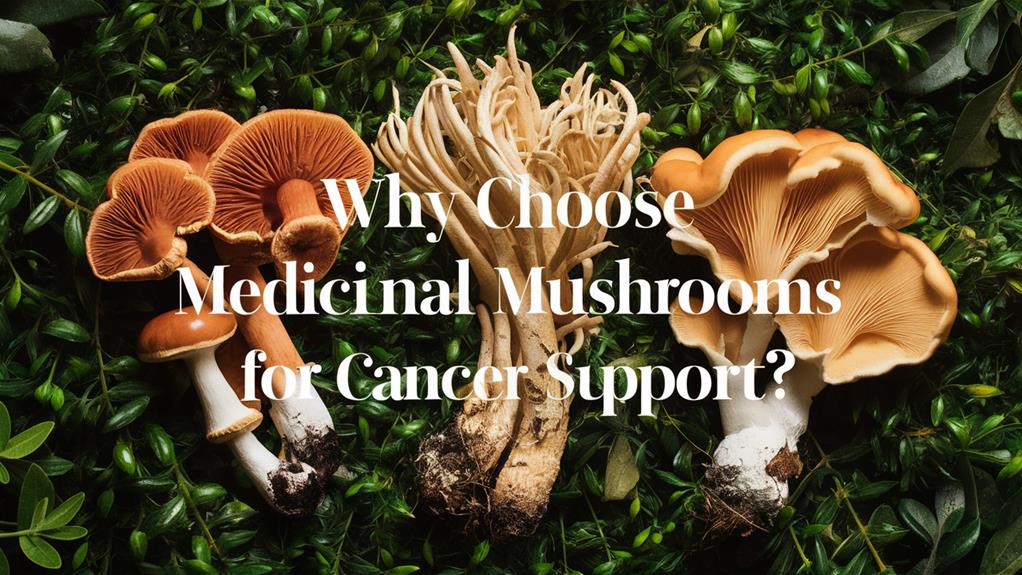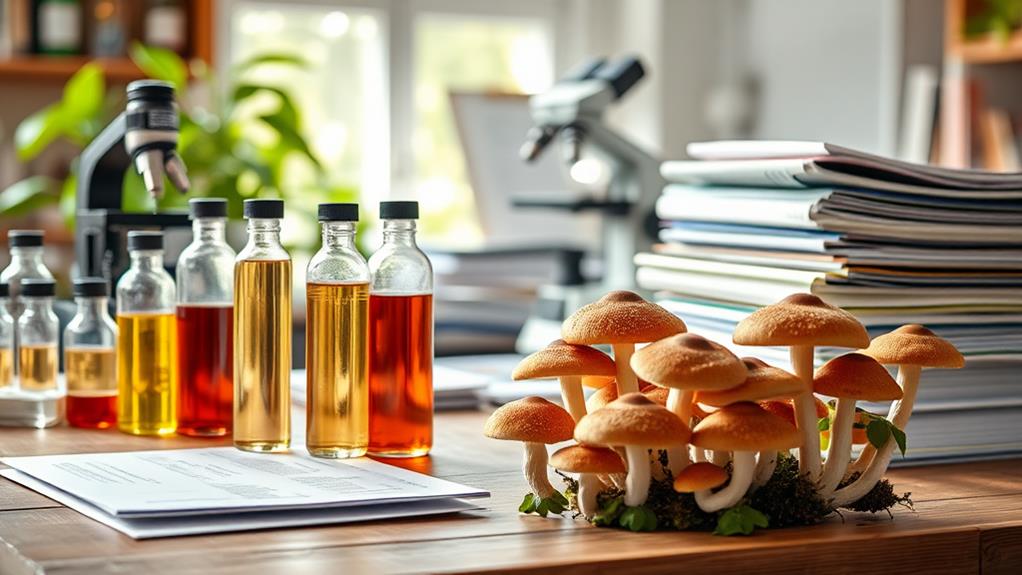
Choosing medicinal mushrooms for cancer support can provide significant benefits. These mushrooms, like turkey tail and reishi, enhance your immune system, helping your body fight illness. Studies show that polysaccharides in these fungi boost your immune response, making treatments like chemotherapy more effective. For instance, patients using turkey tail's PSK have shown improved survival rates and reduced cancer recurrence. Besides boosting immunity, these mushrooms can also minimize side effects during treatment. While mushrooms are not FDA-approved for cancer, they may be a valuable addition to your care plan. Discover more about their benefits and safety for your health journey.
Overview of Medicinal Mushrooms

Medicinal mushrooms have captivated health enthusiasts and researchers alike for centuries, particularly in Asian cultures where their therapeutic properties are well-documented.
These fungi, such as Ganoderma lucidum (reishi) and Trametes versicolor (turkey tail), offer unique health benefits that can support cancer treatment. Recent studies highlight the potential for mushrooms in enhancing immune function, which is crucial for cancer support.
You might be surprised to learn that polysaccharides, especially beta-glucans found in turkey tail mushrooms, enhance the immune response against cancer.
In countries like Japan and China, specific medicinal mushrooms, like PSK derived from turkey tail, have been approved as adjunct treatments for various cancers.
They've shown effectiveness in improving survival rates and reducing recurrence, making them an essential part of integrative medicine.
Over the last decade, more than 2,000 studies have focused on the anticancer effects of these mushrooms, highlighting their importance in modern healthcare.
Immune System Support
In recent years, the role of mushrooms in bolstering the immune system has gained significant attention, especially among cancer patients. Medicinal mushrooms, like turkey tail, contain a powerful compound called polysaccharide-K (PSK). Research shows that PSK can enhance immune function and improve survival rates for those undergoing chemotherapy. This is vital, as chemotherapy can weaken your immune system.
Additionally, the *antioxidants in mushrooms* aiding overall health contribute to their effectiveness in supporting the body during treatment.
Mushrooms such as shiitake and maitake also play a crucial role in immune support. They stimulate natural killer cells and T-cells, which are essential for fighting cancer cells.
Clinical studies have demonstrated that PSK helps repair immune cell damage caused by chemotherapy, particularly in gastric cancer patients. This repair can lead to better overall survival outcomes.
A systematic review found that patients taking mushroom-derived PSK saw a 9% reduction in 5-year mortality rates. This highlights how important it's to support your immune system during cancer treatment.
The immune-boosting properties of medicinal mushrooms come from their rich content of beta-glucans and other bioactive compounds, which help modulate immune responses and enhance your overall well-being.
Integrating these mushrooms into your routine could be a beneficial step in your cancer journey.
Evidence From Clinical Studies

Clinical studies provide compelling evidence of the effectiveness of polysaccharide K (PSK) from turkey tail mushrooms in enhancing cancer treatment outcomes.
Research shows that using PSK can be a game-changer for cancer patients, particularly as part of a holistic approach to health that includes health benefits of mushrooms.
Here are some key findings that highlight its potential:
- PSK significantly improves survival rates and reduces recurrence in gastric and colorectal cancer.
- A systematic review indicated a 9% absolute reduction in 5-year mortality for patients taking PSK.
- Over 8,000 patients in various trials reported enhanced immune support and overall well-being, especially in lung cancer patients.
- The D-fraction from maitake mushrooms increased response rates in breast cancer patients from 12% to 28% when combined with chemotherapy.
- Advanced cancer patients using active hexose correlated compound (AHCC) from shiitake mushrooms showed significant tumor responses and increased natural killer cell activity.
These studies demonstrate that medicinal mushrooms aren't just folklore; they offer real support for cancer patients.
By improving quality of life, enhancing chemosensitivity, and acting as an adjunct therapy, mushrooms like PSK can provide valuable immune support during treatment.
Don't underestimate the power of these natural allies in your cancer journey.
Safety and Regulation
When considering the use of medicinal mushrooms like turkey tail and reishi for cancer support, it's crucial to be aware of their safety and regulatory status. The FDA doesn't approve these mushrooms for cancer treatment, so it's important to approach them with caution.
Many consumers may not realize that quality products and educational resources are essential when choosing mushroom supplements. The regulation of dietary supplements, including mushroom extracts, differs from pharmaceuticals. This means there's often variability in quality and effectiveness across different brands and batches.
Although some studies in Japan show few side effects from polysaccharide K (PSK), the safety profile of these supplements in other populations isn't well understood. As a consumer, you should be cautious, especially since some manufacturers make misleading claims about their products.
Always consult healthcare professionals before starting any new supplement regimen, as they can provide valuable guidance tailored to your situation.
If you have a compromised immune system, monitoring is particularly important. Medicinal mushrooms may interact with immunosuppressive therapies, so you need to consider safety and regulation carefully.
Being informed and proactive will help you navigate the world of dietary supplements and make choices that support your health while minimizing risks.
Integrating Mushrooms in Treatment

Although many people are unaware, integrating medicinal mushrooms like Turkey Tail and Shiitake into cancer treatment could offer valuable benefits. Here are some reasons to consider:
- Boosts immune function
- Reduces chemotherapy side effects
- Enhances anticancer activity
- Improves quality of life
- Supported by clinical trials
For patients undergoing chemotherapy, medicinal mushrooms can be a powerful ally. Turkey Tail contains polysaccharide K (PSK), which has shown promise in improving immune response and lowering recurrence rates for various cancers.
Meanwhile, Shiitake's active compounds, like lentinan, can enhance chemotherapy's efficacy and overall survival rates. Clinical trials with Maitake have even demonstrated increased chemotherapy response rates.
Integrating these mushrooms into your treatment plan may not only help reduce side effects, but also promote a greater quality of life. As research continues, the potential for medicinal mushrooms in integrative cancer care becomes clearer.
Many traditional medicine practices have long recognized their benefits, and modern studies are now supporting these claims. So, if you're exploring complementary therapies, consider discussing the inclusion of medicinal mushrooms with your healthcare provider.
Conclusion
Incorporating medicinal mushrooms into cancer support can be a wise choice. With their potential to boost your immune system and positive findings from clinical studies, these natural allies might enhance your overall well-being. Remember, "a stitch in time saves nine," so it's essential to discuss any new treatment with your healthcare provider. By integrating mushrooms thoughtfully, you can take proactive steps in your health journey, supporting your body as it faces challenges.
